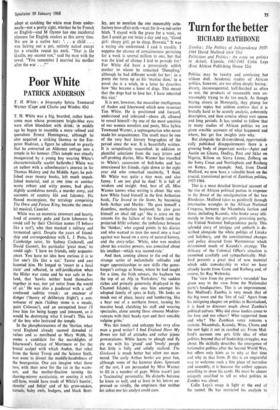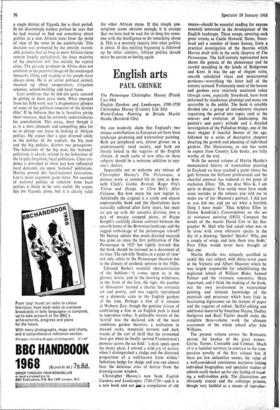Zambia : The Politics of Independence 1957- 1964 David Mulford
(ouP 55s)
Turn for the better
RICHARD RATHBONE
Politicians and Politics: An essay on politics in Acholi, Uganda, 1962-1965 Colin Leys (East African Publishing House 12s) Politics may be tawdry and confusing but seldom dull. Academic studies of African politics, however, are too often deeply boring . dreary, inconsequential, half-finished as often as not, the products of reasonable men un- reasonably trying to do too much. As though buying streets in Monopoly, they plump for massive topics but seldom confess that it is brutally hard to be acutely analytic, coherently descriptive, and then concise about vast spaces and long periods. It has tended to follow that in many studies of African politics we are given sensible accounts of what happened and where, but get few insights into why.
But alongside the ill-considered, opportunisti- cally published disappointments there is a growing body of important works—Apter and Austin on Ghana, Dudley, Post and Sklar on Nigeria, Kilson on Sierra Leone, Zolberg on the Ivory Coast and Nottingham and Rosberg on Kenya, for example. And, from David Mulford, we now have a valuable book on the crucial, transitional period of Zambian politics, 1957-1964.
This is a most detailed historical account of the rise of African political parties in response to the threat of the amalgamation of the two Rhodesias. Mulford takes us painlessly/ through internecine wrangles in the African National Congress, between the Nkumbula faction and those, including Kaunda, who broke away ulti- mately to form the presently governing party, the United National Independence party. This splendid story of intrigue and ambush is de- scribed alongside the white politics of Lusaka and Salisbury, and the constitutional changes and policy directed from Westminster which determined much of Kaunda's strategy. The delicacy of the Colonial Office's situation is examined carefully and sympathetically. Mul- ford presents a great deal of new material which adds considerably to what we have already learnt from Gann and Rptberg and, of course, Sir Roy Welensky.
The 'view from the governor's verandah' has given way to the view from the Nationalist party's headquarters. This is an improvement. But Mulford's Zambia is very much that of the big town and the 'line of rail.' Apart from his intriguing chapter on politics in Barotseland, it is hard to discover much about Zambia's political culture. Why did those leaders come to the fore and not others? Who supported them and why? The Zambian voter remains a statistic. Nkumbula, Kaunda, Wina, Chona and the rest fight it out in rarefied air. From Mul- ford's account one gets little idea of what politics, beyond that of leadership struggles, was about. He skilfully describes the emergence of nationalist politics after the Second World War, but offers only hints as to why at that time and why in that form. If this is an ungrateful way to welcome such a fine piece of narrative and assembly, it is because the author appears unwilling to show his cards. He must be almost uniquely qualified to tell us what politics in Zambia was about.
Colin Leys's essay is light at the end of the tunnel. He has restricted his analysis to
a single district of Uganda for a short period. In his disarmingly modest preface he says that he had wanted to find out something about politics in a new African state from the point of view of the voter in the countryside. This decision was prompted by the entirely reason- able premise that so long as most African states remain largely agricultural, the huge majority of the electorate will live outside the capital cities. The peasant producer in Africa does not conform to the paternal image of the unchanged innocent, tilling and reaping as his people have always done. He is an active political animal, steamed up about cooperatives, irrigation schemes, school-building and local taxes.
Leys confesses that he did not quite succeed in getting to these grass roots. What emerged from his field work was 'a fragmentary glimpse of some of the political concerns of the district elite.' If he believes that he is therefore giving short measure, then he seriously underestimates his contribution. This essay, short though it is, is a most eloquent and compelling plea for us to change our focus in looking at African politics. He argues that a gaze directed solely at the politics of the capitals, the big men and the big policies, distorts our perceptions. The behaviour of the big man, the 'national' politician, is closely related to the behaviour of the largely forgotten, local politicians. Clear evi- dence is provided to show just how influential local demands are upon 'national' politicians. Having proved this local-national interaction, Leys's main argument gains force. No account of national politics in isolation from local politics is likely to be very useful. He argues this for Uganda alone, but it is clearly valid for other African states. If this simple pre- scription seems obvious enough, it is strange that we have had to wait for so long for some- one with the intelligence to do something about it. This is a masterly inquiry into what politics is about. If this exciting beginning is followed up by other scholars, African politics should never be arcane or boring again.



































 Previous page
Previous page